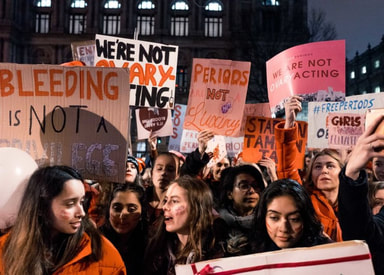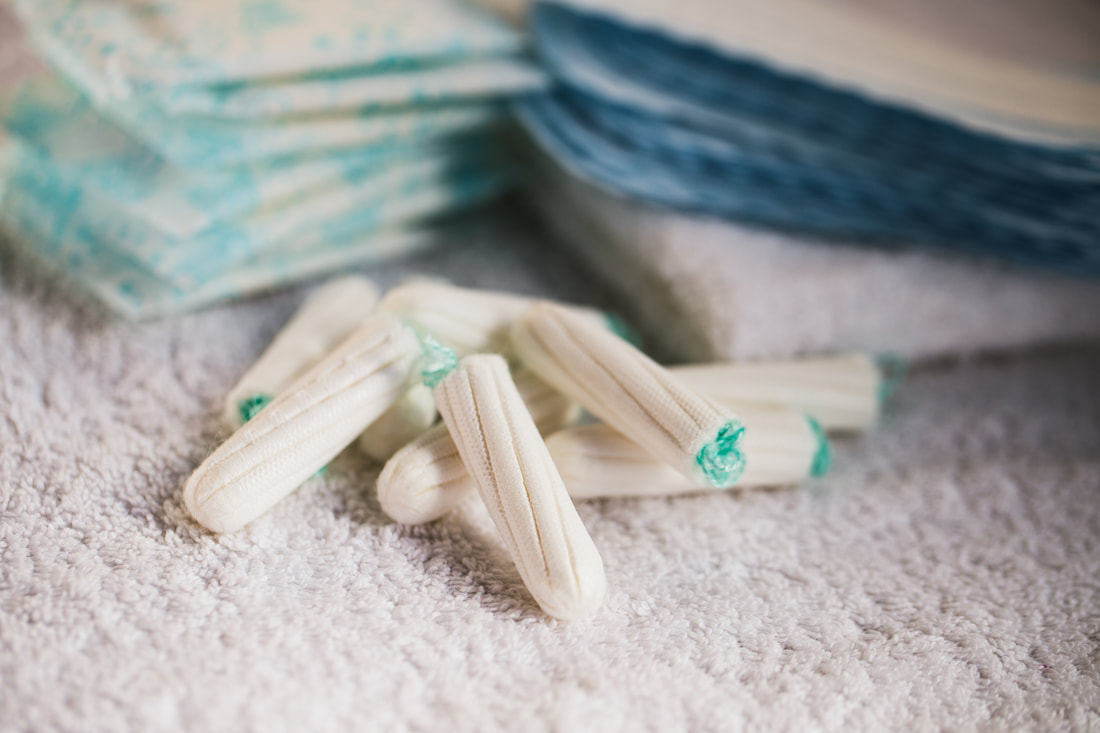 This article appeared in the print edition of the Evening Telegraph: 17/02/2020 I discussed various potential opportunities with my careers adviser before leaving high school but becoming a spokesperson for menstruation was never on my list. However, that became my lot a few years ago when an increasing number of women and girls presented at foodbanks across Scotland in need of sanitary items. Many women, due to circumstances beyond their control, were forced to supplement the use of sanitary items with socks, toilet roll and newspaper. My awakening came like a lightning bolt when, in 2010, one young lady came to Dundee Foodbank and turned down sanitary items stating she was too malnourished due to a lack of calories. From 2016, I was called upon for interviews with various media outlets to discuss what became known as “period poverty” and, in 2017, I and my colleagues submitted a detailed report to Aileen Campbell when she was the Minister for Public Health. Alongside other grassroots campaigns, this led to a pilot in Aberdeen followed by £9.2 million of Scottish Government investment to ensure sanitary provision in schools, universities, libraries and leisure facilities. In 2018, I retreated and assumed that was the job done until a fortnight ago when Aileen Campbell, now the Cabinet Secretary for Communities, opposed the bill on the free provision of period products. The architect of the bill, Scottish Labour’s Monica Lennon, has been the single most fervent champion for the universal provision of sanitary items. She and I met in Holyrood the day after the Local Government and Communities Committee voted by five to two against it, citing concerns over cost and implementation. Scottish Green MSP, Andy Wightman, highlighted that the principle of universalism is at stake and there is a need to counter the belief that you can institute rights without legislation. Monica said: “The driving principle of the bill is achieving period dignity for all.” She adds: “Legislation is essential to secure rights and protect the progress made so far. Means-testing menstruation is not practical or dignified – a universal approach is progressive.” The bill has support from the Scottish Labour Party, Scottish Green Party, Scottish Liberal Democrats and, in a live interview, the new leader of the Scottish Conservative Party, Jackson Carlaw, pledged support. SNP equivocation has infuriated members. Last week, I met the SNP Students National Equalities Officer, Stuart Smith, who has already secured significant support within his party including some elected members. He said: “We are the party of the baby box, universal education, free prescriptions and free personal care.” He adds: “There may be economic concerns but that is what stage two of the parliamentary process is for.” Nevertheless, on Tuesday 25 February, the bill will be presented and the SNP are at least four votes shy of a majority, which means if all other parties vote for it, we could see a political earthquake and irreparable damage done to the SNP claim they are the party of gender equality.
0 Comments
Free Provision of Sanitary Products: The Bill that could tackle period poverty, and so much more2/6/2020  The ‘Proposed Sanitary Products (Free Provision) (Scotland) Bill' has been criticised at the first stage on 5 February 2020. This article discusses why the Scottish Government should consider the positive implications of the proposed Bill which could not only tackle period poverty, but also positively impact those suffering with endometriosis. “You can’t have a world class education system if students are skipping class when they have their period. They should be able to visit the toilet safe in the knowledge that sanitary products are freely available.” [i] In a column penned for The Big Issue magazine in 2017, MSP Monica Lennon passionately stressed the importance of ensuring menstruation does not hinder the education of Scottish students. Lennon’s draft proposal, lodged on 11 August 2017, motivated numerous universities, schools and colleges to undertake an obligation to ensure the provision of free sanitary products in their establishments. The draft proposal (which was introduced as a Bill in the Scottish Parliament on 23 April 2019) had the potential to position Scotland as a driving force behind tackling the issues posed to women* by often expensive period products, thanks in no small part to unfair taxes imposed by an antiquated system of taxation. The campaign led by Lennon gave women in Scotland hope that they would no longer worry over the costs of sanitary products whilst living in a nation that was likely to become an innovative player in the campaign to end period poverty. It’s one of many reasons why the recent criticism of the Bill by Holyrood MSPs at its first stage has come as a huge disappointment. The key criticisms of the Bill were published on 5 February 2020, with the primary concern of the Local Government and Communities Committee being the cost. In addition, there were concerns over who would bear this cost should the Scottish Government choose not to. The criticisms have left some women in Scotland feeling deflated due to the impact that the legislation could have had, not only on period poverty, but also on relieving the financial burden of those suffering from endometriosis. Endometriosis For those of you who aren’t aware, endometriosis “is a condition where tissue similar to the lining of the womb starts to grow in other places, such as the ovaries and fallopian tubes.” [ii] The condition is often excruciatingly painful, extremely debilitating and has been listed among the 20 most painful conditions to experience alongside heart attacks and arthritis. [iii] In addition to often unbearable pain, endometriosis can also cause abnormal amounts of bleeding during the menstrual cycle. The definition of ‘normal’ menses is less than 80 mL of blood being shed, [iv] therefore, someone suffering with this illness will likely lose more than 80mL during their menstrual cycle. The Financial, Psychological and Educational Cost of Endometriosis Financial and Psychological As endometriosis can cause uncharacteristically heavy bleeding during the menstrual cycle, sufferers sometimes have to change their sanitary products as often as every hour (if they are able to make it that long). This is compared to guidelines that suggest sanitary products only need to be changed every 4 to 6 hours. [v] In addition, an endometriosis sufferer may also experience irregular periods which may last longer than 7 days. [vi] Consequently, the number of sanitary products which are utilised by a sufferer of endometriosis will generally far outnumber the number of sanitary products which are utilised by a woman without the condition. Using the above guidelines, on a very basic comparison an endometriosis sufferer could be using 4 to 6 times the number of sanitary products that someone with a ‘normal’ period uses on any given day. The financial burden that this places on sufferers is significant. Given that the average lifetime costs of managing a menstrual cycle are somewhere between £1,000 and £1,500, [vii] the costs for a sufferer of endometriosis could be astronomical. This is where the Proposed Sanitary Products (Free Provision) (Scotland) Bill could have a huge impact on sufferers of endometriosis, and one of the many reasons why the Scottish Government should begin to seriously consider how they could practicably bear the costs in order to improve the quality of life of sufferers. The provision of free sanitary products would alleviate the financial burden of purchasing multiple sanitary products massively and allow sufferers to worry less about dedicating a large proportion of their income to sanitary products. It has already been shown that providing women free sanitary products, regardless of income or reproductive health issues, has a positive effect. During the Aberdeen pilot of the Access to Sanitary Products programme [vii] which ran between September 2017 and February 2018, 63% of those involved felt that taking part in the pilot had an impact on them. The most common response when asked specifically what kind of impact the pilot made was that those involved had “more money available to spend on other essential items” and that they were “less worried about having [their] period”. One respondent was quoted as saying free sanitary products provided in this way would be “a god send for me and 2 daughters. Between the 3 of us someone is always having a period.” It’s unknown if any of the participants in the said pilot suffered from endometriosis. However, it is clear that the provision of free sanitary products has been shown to relieve both the financial pressure of purchasing sanitary products and also relieve the anxiety associated with having a period due to period products being easily accessible. The impact this could have on women with endometriosis is significant. Several studies have reported the association between endometriosis and psychological diseases, underlining that endometriosis is related to a wide range of psychiatric symptoms especially depression, anxiety, psychosocial stress and a poor quality of life. According to recent literature, depression and anxiety are the most common disorders associated with endometriosis. [viii] If the provision of free period products could help to alleviate that anxiety in some way, whilst also simultaneously reducing Scotland’s rate of poor mental health (15% of adults in Scotland have low wellbeing or a possible psychiatric disorder) [ix], then this Bill seems highly worthy of being enshrined into law and should be considered in line with the wider impacts it is likely to have. Educational In addition to alleviating strain on both financial and mental wellbeing, the provision of free sanitary products to those suffering from endometriosis must be considered in order to ensure, if not further, the education of sufferers. The Access to Free Sanitary Products for those at school, college or university study carried out by Child Rights and Wellbeing Impact Assessment (CRWIA) [x] in 2017/18 found that around a quarter of respondents, 26% of which were currently in education, said they had struggled to access sanitary products in previous year. Around 6 in 10 respondents who reported struggling to access products said that this was because they didn’t have the product they needed. Tie this into anecdotal evidence from the aforementioned Aberdeen Pilot scheme that some girls are missing education in order to manage their menstruation, and we begin to see that lack of period products could have a huge impact on educational attainment. If we then consider that, according to the CRWIA study, the most common way respondents in education who had struggled to access products coped was having to ask someone else for a tampon/towel (71%) or to use an alternative e.g. toilet paper (70%), we see how unfeasible this is for someone suffering with endometriosis. It would be both impractical and uncomfortable for a sufferer of endometriosis to ask a friend or a teacher for a new tampon or sanitary towel every other hour. It would be nigh on impossible to use toilet paper due to the volume of blood that an endometriosis sufferer would lose. Should free period products not be readily available, then the affected individual would most likely have to leave school, college or university early, missing out on classes, or, knowing the stress and embarrassment that not having adequate period products can cause, simply fail to show up at all when their period is due. This would be so damaging to the education of sufferers of endometriosis, where it is not uncommon to experience heavy bleeding for over a week. It’s quite clear that the provision of free sanitary products is important to furthering the education of both women with normal periods and endometriosis sufferers alike. Given the potential for academic attainment to fall drastically in the wake of a period without the proper sanitary protection, the Scottish Government should perhaps consider how it might commit a portion of its education budget in order to bear the cost of such products in order for them to be made available to all even where some educational establishments are unable to bear the cost of providing free sanitary products. Conclusion A very small selection of the benefits of the aforementioned Bill have been discussed here, and whilst they have been framed from the point of view of an endometriosis sufferer, the analyses given can apply to women from all walks of life. A number of women are facing a poorer quality of life due to the financial and psychological burden placed on them due to being unable to source adequate sanitary products, or having to pay through the nose when they are able to find them. Enshrining the provision of free sanitary products into law will help to ensure no woman has to miss out on employment or education due to being unable to prepare for a natural process so out of their control. It will ensure that no woman feels anxiety over deciding whether they can afford to buy meals for the week, or packets of overpriced sanitary products. It will ensure that a teenage girl already battling the difficulties of hormones, puberty and becoming a woman won’t have to run home red faced and in a panic when she’s caught short. The positive implications of Monica Lennon’s campaign and subsequent Bill go right to the heart of the issue, and could go a long way in ensuring that Scotland is a pioneer of menstrual equity. *It should be noted that reference to ‘woman’, ‘women’, ‘female(s)’ or 'girl(s)' throughout this article is inclusive of those individuals who may no longer identify as female but are biologically still able to have a menstrual cycle and so are directly impacted by the issues raised. [i] https://www.bigissue.com/opinion/monica-lennon-ill-make-period-poverty-history/ [ii] https://www.nhs.uk/conditions/endometriosis/ [iii] https://metro.co.uk/2018/10/30/these-are-the-20-most-painful-illnesses-according-to-the-nhs-8088456/ [iv] https://www.uptodate.com/contents/approach-to-abnormal-uterine-bleeding-in-nonpregnant-reproductive-age-women [v] https://tampax.co.uk/en-gb/tampax-articles/my-first-tampon/how-often-should-you-change-your-tampon [vi] https://www.endofound.org/endometriosis-symptoms [vii] https://www.gov.scot/binaries/content/documents/govscot/publications/research-publication/2018/05/access-sanitary-products-aberdeen-pilot-evaluation-report/documents/00535768-pdf/00535768-pdf/govscot%3Adocument edit. The last couple of years has seen a growing public interest in period poverty, revealing particular gendered patterns of poverty. A 2018 poll suggested that nearly 20% of girls and women in Scotland are unable to afford period products such as pads and tampons[1]. Much of this attention has been on girls and women who are in the education system or who are using foodbanks. Also in 2018, the Scottish Government launched a scheme to ensure all schools, colleges and universities provide free period products for those who require them[2]. Similar efforts are in place to help homeless women access the period products they require[3]. These are significant steps toward making Scotland a global leader in challenging period poverty. However, a focus on education or on those who are not in employment or who are using foodbanks neglects the experiences of women, trans and non-binary people in employment who may also experience period poverty.
Our research conducted between 2017 to 2019 has revealed that many women, trans and non-binary people struggle to manage their period while they are at work. This can be worse for those living with conditions such as endometriosis which can cause heavy menstrual bleeding and considerable pain. Our data suggests that women may be absent from work due to severe menstrual symptoms, but are unlikely to report the true reason for their absence due to embarrassment. In the summer of 2018 Danielle Rowley, the then MP for Midlothian shared her experiences of the costs of menstruation[4]. Her story of stained trousers attracted considerable media attention and highlighted that broader costs of menstruation, particularly heavy periods. Our research also suggests that some people, even in highly skilled careers such as education, are unable to afford not only menstrual products, but also over the counter medications, clothing and other required items. Women, trans and non-binary participants in the research shared distressing accounts of attempting to manage their periods and gynaecological health conditions when unable to afford appropriate products. While the focus on period poverty remains on those accessing education and those experiencing extreme hardship, we are missing the realities of those who are stuck in cycles of precarious work and low pay. A radical approach is needed and universal access to menstrual products would ensure that no one missed school, work or social activities because they can’t access towels, tampons or cups. A universal approach would prevent anyone from falling through the cracks of policies which target specific groups. Period poverty can be experienced by anyone and is a workplace issue. When we go to work we don’t expect to bring our own toilet paper or handwash with us! It’s time for period products to be recognised as the essential item that they are and to be accessible to all. [1] https://www.theguardian.com/society/2018/feb/05/period-poverty-scotland-poll-shows-women-go-to-desperate-lengths [2] https://www.bbc.co.uk/news/uk-scotland-45295743 [3] https://www.scotsman.com/regions/glasgow-strathclyde/glasgow-s-homeless-women-to-be-given-free-sanitary-towels-1-4540168 [4] https://www.glamourmagazine.co.uk/article/danielle-rowley-interview |
AuthorWrite something about yourself. No need to be fancy, just an overview. Archives
February 2024
Categories |

 RSS Feed
RSS Feed